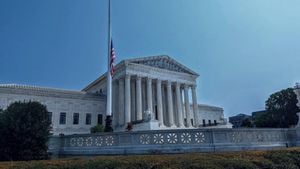The recent Autumn Budget 2024 has sparked discussions and reactions across the political spectrum, with various stakeholders weighing the potential effects on the UK economy and public services. Chancellor Rachel Reeves unveiled the first Labour Budget since 2008, marking significant policy shifts and pledging substantial funding aimed at revamping public services and addressing the cost of living crisis.
Reeves, seizing the opportunity to implement her vision, rolled out tax hikes amounting to approximately £40 billion, aimed primarily at corporations, smokers, and drinkers. This includes notable increases to National Insurance contributions for businesses. The Chancellor framed these hikes as necessary for funding public services, particularly the NHS, stating, "I am keeping every single promise on tax... This government chooses to protect working people every single time," as she elaborated on maintaining the freeze on fuel duties amid rising costs.
Opposition leader Rishi Sunak did not hold back his criticism, referring to the budget as a "tax trap of broken promises," and highlighting how increased taxation would burden working citizens. Sunak expressed his concerns over the budget's potential to stifle economic growth, calling the tax increases detrimental to economic recovery efforts. He argued, "They have fiddled the figures. They have broken their promises, and it is the working people of this country who are going to pay the price now," emphasizing the discontent among Conservative ranks.
The raised National Insurance rate from 13.8% to 15% for employers is expected to drive up the cost of hiring, reportedly adding about £2,367 for each employee on minimum wage by the following April. Critics, including economists and business leaders, fear this increase might push businesses to pass on these costs to consumers through higher prices, thereby countering Reeves’ protective claims.
Interestingly, the budget also included some relief measures such as freezing fuel duties, which many saw as part of the broader strategy to alleviate the cost of living pressures on households. "While the cost of living remains high... increasing fuel duty next year would be the wrong choice for working people," Reeves stated, positioning her government as responsive to public concerns.
Alongside tax discussions, the budget emphasized funding allocations, particularly for significant initiatives such as the £20 million earmarked for Cheltenham’s Golden Valley project, aiming to boost local employment through the establishment of the National Cyber Innovation Centre. This funding reaffirmation highlights the government’s commitment to fostering innovation and growth within the technology sector, reflecting the broader economic strategy laid out by the Labour administration.
It’s worth mentioning how various reactions flowed from community leaders. Councillor Rowena Hay from Cheltenham welcomed the confirmation of funding, expressing optimism about the potential for job creation and economic revitalization stemming from this development. She said, "The National Cyber Innovation Centre... will be a national asset... our vision and ambition for the Golden Valley development can continue to progress." This sentiment showcases the local government’s collaborative approach to economic recovery, akin to the aspirations laid out by Reeves.
Meanwhile, responses from charitable sectors indicated mixed sentiments. Some organizations welcomed enhanced funding commitments, yet others warned about the overarching burden of tax increases, which could strain charitable contributions as businesses grapple with heightened operational costs. The discussion around the budget's impact on charities emphasized the importance of sustained support and strategic funding to minimize adverse consequences.
Notably, the budget's potential consequences for Universal Credit recipients were also highlighted, particularly with changes to deduction limits. More than one million disadvantaged families are expected to benefit from these changes, with lower caps on repayment deductions leading to approximately £420 more available per household yearly. This measure drew favorable reactions from advocacy groups highlighting its importance amid the current economic struggles.
Looking beyond immediate fiscal impacts, analysts are closely monitoring how this budget aligns with broader economic indicators and growth forecasts. The Office for Budget Responsibility (OBR) projected sluggish growth under the current government’s financial strategy, prompting questions about the strategies employed to stimulate recovery and stabilize economic performance.
Political analysts suggest this budget could shape the future electoral prospects for Labour and Conservatives, particularly as public sentiments on taxation and economic viability evolve. The emphasis on public service funding juxtaposed with the critiques of increased taxation exposes the fragile equilibrium the government must navigate as they seek to implement their policies.
Reeves emphasized, "... the fiscal position is so difficult... we have to be frank..." signaling recognition of the complex challenge of balancing public needs against economic realities. This nuance reflects broader discussions among economists about the sustainability of various funding models and the necessity for careful fiscal management over time.
Overall, the reactions to the Autumn Budget 2024 encapsulate the dual challenges of governance: managing public expectations for welfare improvements against the backdrop of fiscal constraints and public sentiment toward taxation. With industry leaders and public advocates continuing to voice their perspectives, the government faces pressure to derive actionable strategies moving forward, all under the scrutiny of analytical lenses and public awareness.



